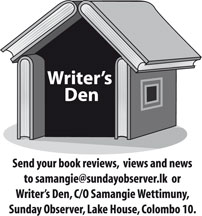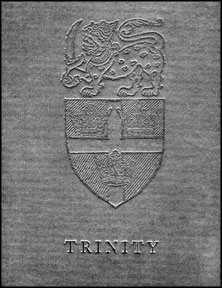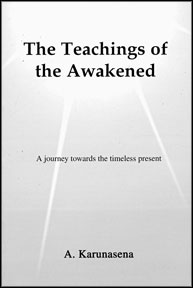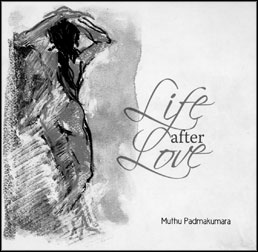Trinity from A to Z
Reviewed by Sajitha PREMATUNGE
 How
boring could a whole history of a school - worth of 180 pages - be,
especially if it is not your own? Well if it is Trinity by Ramya
Chamalie Jirasinghe it makes a whole lot of difference. For one it is
thoroughly researched, it is not about the boring stats like how many
students attended the school since its establishment, how many teachers,
how many square feet, buildings, etc... No, the poet in Ramya does not
allow that. How
boring could a whole history of a school - worth of 180 pages - be,
especially if it is not your own? Well if it is Trinity by Ramya
Chamalie Jirasinghe it makes a whole lot of difference. For one it is
thoroughly researched, it is not about the boring stats like how many
students attended the school since its establishment, how many teachers,
how many square feet, buildings, etc... No, the poet in Ramya does not
allow that.
 |
|
TRINITY
Author: Ramya Chamalie Jayasinghe |
A commissioned work, the prudence of the Trinity OBA is obvious in
their selection of Ramya - a poet cum nonfiction writer, to write the
book.
Although the book also mentions all the necessary, supposedly
'boring' details, it reads like a novel, at times it is even poetic.
`Trinity' is Trinity from A to Z, providing an account of the whole
history of a school that has stood the test of time.
The book traces the history of a school that had to continuously
adapt and change according to the times, since as far back as the 1800s.
From introducing water borne sanitation to building of the Asgiriya
stadium, it is a well documented turn of events. She talks about its
humble beginnings when it was established as an elementary school by
Rev. Browning and his wife in 1822, how Richard Collins gave it a firm
foundation, how Fraser transformed it from Missionary to school and how
it went from the 'Collegiate school' to `Oakley's school' to `Trinity
College'.
Trinity would have been a totally different place if it weren't for
Fraser, one of its most charismatic principals. He was the first
principal to break down the caste system ,and introduced vernacular to
the curricula. Instead of a documentary the book reads more like a
story. We can just picture how Fraser - with the help of just a handful
of cadets prevented major disasters during the riots, not for the school
but for the whole town of Kandy.
It is not just a history of Trinity. The first few chapters are
actually a portrayal of the social setting through Trinity. It provides
us a glimpse of the major turning points at a time of turmoil. The book
explores how the Official Language Act affected a school like Trinity
that offered a `Western education' and how the wave of nationalism
forever changed schools like Trinity. Ramya - through reviewing probably
most or even all existing documents on the subject - has become an
authority on Trinity.
But the most interesting facts (for me) are probably the ones Ramya
dwells least on, such as the founder of Kingwood College - Louis Edmund
Blaze - being a past student of Trinity or the interesting history
behind Hillwood College, Kandy. It's a little known fact that Hillwood
College was actually established so that educated young men of Trinity
could choose educated young women from Hillwood College as their wives.
Trinity introduced Astronomy and Rugby to schools and theirs was the
first social workers group. The book also provides other invaluable
information such as the origin of the Bradby Shield and how Duncan White
lost his Lion for stealing biscuits from a teachers' quarters! Ramya has
a knack for saying things without stepping on anyone's toes.
Trinity is stereotyped as a school for the elite. Ramya doesn't beat
around the bush, it is an `elite school', but one that feels the pulse
of the Kandyan people. She claims - and such an in-depth study no doubt
warrants her authority - that the education offered by Trinity enables
its students to straddle two worlds. Ramya introduces Trinity as a
school having a particular `form' and `shade' as opposed to other
missionary schools in Ceylon. It had to respect the cultural identity
that the Kandiyans held so high.
The book Trinity is thoroughly researched, not just in terms of
technicalities but also the cultural background and its effects on the
establishment. It backs its research with maps, postcards, portraits,
photographs, paintings, interviews, references to magazines and
newspaper articles and other historical documents. The first chapter - A
most opportune time - demonstrates Ramya's in-depth study into the
social as well as the geographical setting.
But it is not just about the school. The chapter Spirit of a
Trinitian focuses on such people that understood the `spirit of a
Trinitian'. During the riots of 83 Sinhala students of Trinity refused
to abandon their Tamil friends. It is also about the people who define
Trinity, not just about the principals but the students - the pride of
Trinity - the likes of Denzil Kobbekaduwa, Lieutenant Aladeniya,
Ministers Lakshman Kadirgamar, Gamini Dissanayake, M. L. Mushin the only
Sri Lankan Vice President to the World Bank, artistes like George Keyt,
David Paynter, Donald Ramanayake, Stanley Kirinde and many more. Ramya's
expertise in art is evident in the manner in which she compares the
murals of David Paynter and the paintings of Stanley Kirinde. However
the exclusion of the village scene by Kirinde to compare the two artists
with is a drawback.
Ramya has wisely kept the best for last. The last chapter of the book
is dedicated to the story of `the Sinhalese Chapel' for Trinity. Ramya
focuses on each and every minute detail of the chapel, with the
enthusiasm of an archaeologist examining a newly discovered
hieroglyphic. Reinforced with pictures, she describes it as a work of
art. Ramya gets increasingly poetic towards the end, and it is never
more obvious than in the story of the chapel.
The chapel has been left unpainted, she says, and it derived its
colours from its surroundings, from the long shadows of the pillars,
cast during sunset or the `moods of the trees' and ends the book with a
reference to the three magnificent murals of the chapel by David Paynter,
leaving a lasting impression on the reader.
Ideal for students of philosophy and comparative religion
Reviewed by Tissa WELLAPPILI
A treatise on Buddha's philosophy, "The Teachings of the Awakened" by
A. Karunasena, is much different in emphasis from the normal and the
majority of books dealing with Buddhism or the Buddha; and as such
should receive a wide audience from all sectors of philosophical
thought. The author takes a frankly agnostic stance and looks at the
teachings of the Buddha beyond the traditional bounds of most offerings
from temples. Whilst avoiding preaching, the writer guides the reader
through main tenets, without demanding acceptance of his interpretation
of the teachings - which is radically different from the traditional
version. He clearly separates belief as required in a religion from the
necessity of understanding and appropriate action - which are very
helpful for those looking for a practical, logical and meaningful
insight to the teachings. This book provides a fresh insight, skilfully
bringing out an incisive, focused re-appraisal of the Buddha's message
that fits into the modern world.
 |
|
Author: A. Karunasena
Printed by: Commercial Printing Dept. Associated Newspapers
of Ceylon Ltd. |
This book is profound on many levels that even a committed Buddhist
would find it challenging and thought-provoking. It is written in a
language that would suit beginners, westerners new to Buddhism and
followers of other faiths who wish to learn the philosophy. It also
carries an essential message for those familiar with Buddhist practice
i.e., act as a catalyst for a critical re-appraisal of their practice
and attitude towards the teachings of the Buddha. What it does so
uniquely well is to separate the Buddha's teachings from `religion' by
showing that `the self' and `doubt' are necessary parts of faith rather
than hindrances.
It completely eschews jargon very effectively - and moves on to
analyse the mind process, timelessness of dhamma and the need for direct
experience. Interestingly, this style is closer to the Lord Buddha's
message because personal experience is so much more important than
dogma.
The book is neatly chaptered, making it ideal for contemplation over
a period of time. It basically provokes us to ask many questions about
our understanding of the teachings and see how we can integrate them to
our living. The general topics covered are Dhamma Language, World - a
Buddhist perception and the contradictions of considering Buddhism a
religion. Author goes on to explain the concept of timelessness, the
Five Aggregates, Dependent Origination and the self in such a manner
taking the reader on a voyage from a general view to a deeper level of
understanding.
Though the book is quite short (212 pages) it is very stimulating.
This book is a revelation, as it does not try to make a religion out of
the Buddha's teachings. The author has looked at the Buddha's teachings
with an open unprejudiced mind and considered facts rationally. He has
rejected blind faith, rites and rituals. This is the main theme
throughout the book and his message is for the readers to adopt the same
approach if they are genuinely interested in the teachings. There is no
compulsion for acceptance of the interpretations given in the book. The
views expressed are sometimes contradictory to those traditionally
accepted and those expressed by some monks, scholars and writers.
Therefore, he wishes the readers to test the contents with rational
thinking and assess the validity of the interpretations.
The author by profession a Chartered Surveyor accepts that he is not
a scholar with a formal education in Buddhism. Nor has he undergone any
monastic training. However, his research on this subject has taken him
to a new dimension which is clearly evident from the contents of this
book. It serves as a guide to many who are in need of proper direction.
I also believe that Karunasena's book on "The Teachings of the Awakened"
has opened a forum to discuss and deliberate on a subject that will be
of interest not only to Buddhists but also to students of philosophy and
comparative religion.
Seminar on poetry and short story writing
The English Writers' Cooperative of Sri Lanka (EWC) invites
applications to a one day seminar on Poetry and Short Story Writing
scheduled for Saturday, June 27, 2009 at the Auditorium of the Sri Lanka
Federation of University Women at 96/25. Kitulwatte Road, Colombo 8 from
8.30 a.m. to 4.30 p.m.
The resource persons will be university academics who will take the
participants through the sessions with talks, comment and discussion.
Those interested are invited to send in their names, addresses,
telephone and email addresses by June 15, 2009 to Vijita Fernando,
572/10 Welikadawatte Road, Rajagiriya with an accompanying fee of Rs.
750 (cash or cheque in favour of the Writers' Cooperative of Sri Lanka)
under registered cover.
The number of participants will be limited to forty and applications
beyond the cut off date cannot be accepted.
Love, lust and disenchantment in contemporary milieu
Reviewed by Ranga CHANDRARATHNE
With a golden key of brevity and sharp-tongued expressions, the young
poetess, Muthu Padmakumara unlocks an intricate web of emotions. `Life
after love' offers candid views as never before seen in the contemporary
Sri Lankan literature in English.
Although "Life after love" is all about love, the poetess expresses
the minutest details of the composite experience of love. It is not only
about love but also of the pangs caused by betrayal and deception.
In the poem "Kissing", he/she describes perhaps the most intimate
moments of the union with a lover. The first person narration has aptly
conveyed the intimacy and the mesmerizing effect on the lover as they
devour every bit of the moment which ultimately turns into love-making.
 |
|
Life after love
by Muthu Padmakumara |
"I can almost feel
The warm brush of each
Line and curve darkening and lightening,
Our breaths merging and melting
It's time,
Time to fall in love again
And I
Could breathe you like this
Forever."
It commences with slow kissing and the sensuous girl acknowledges, at
first, her inexperience in reciprocating the gentle kisses. Yet as the
kisses gather their intensity creating an unbearable urge in the girl,
the lids gently flutter as she totally exposed to embracing reverie.
"The lids gently flutter
When it becomes too much,
Seconds into infinity
Making the heart squeeze
As lips move closer, closer"
This is nothing but the sheer ecstasy of love. The few seconds passed
in the intense moment of love-making seem infinity to the girl. With a
clarity rarely found in Sri Lankan writers in English, Muthu encodes the
experience of lover in a most elegant manner. Poems in her anthology
bear testimony to her mastery in expression and even the division of the
lines.
In the poem "Days of lovers", he/she dwells on carefree days that
lovers would spend embracing each other and exploring each other's
territories. Those were the days in which lovers found everything
romantic even the maiden rays of the sun.
"This moment of waking and awakening,
Of honey god sun
Sweeping over sleepy faces, and passing
One lifetime, to laugh more live more
To a rhythm of our own,
So my darling,
What shall we do this morning?"
This poem is, perhaps, about a just married couple spending their
honeymoon. As the sun rays sweep their sleepy faces, once again lovers
plunge into love-making. She is conscious of the rhythm of their moving
bodies. The poem ends with a question, he/she asks her/his lover "What
shall we do this morning?". The answer is obvious.
The poem "Reluctant lover" is a poem of interest which explores
another dimension in love. Here the lover is reluctant yet yields to the
force beyond her control. It is in a way struggle between emotions and
reason.
"I didn't want to feel
Love, had no place,
Yet hunted from all sides
No rest, not even in sleep.
While my tongue weaves its tales
My soul yields
To become a willing slave
Who's seducing whom?
I never stood a chance
No more than you
I hated to love.
Although she does not want to love and feels that there is no place
for love in her life, she yields unto the forces without quite knowing
"who's seducing whom?". Following her inner struggle, she succumbs to
the forces becoming a `willing slave'.
`Fire' is a poem which once again, is on the theme of blind love.
Here the girl, actually, hates her lover. She wanted to hit him with
hands and feet. However, instead , she succumbs to overwhelming love and
yields unto his kisses and intimate embraces.
"I want to hold you
Close, so close
You beg to breath
Pummel you
With hands and feet
Instead I close my eyes"
"My First" is a brilliantly crafted poem on the first love-making.
Yet she does not want to be conceived or to be a murderer if she aborts
the thus conceived child. Owing to the girl's conservative ideas or
perhaps conventional ideas imposed on her by the milieu, she believes
that love-making is a `sin'.
"I stand before you naked
Exposed
Unaware
I had drawn you close,
I wait
Soon to be a sinner."
The perception of virginity or purity of a girl is deeply rooted in
Asian collective psyche. It is a predominant character not only in
Tamil, Muslim, Christian or any community but also among the Sinhalese.
The loss of virginity (before marriage) is considered a scar on the part
of the family. The poetess explains this in evocative lines. She also
considers the lost virginity as "mistake".
"Saving to remember
The sweeter side to this
Union turned to bitterness,
Aborted in anguish
I wanted you to be all but
My saddest mistake
best forgotten."
The anthology is made up of 30 poems and most of which are evocative
and are an expression of innermost feelings of a lover. However, the
theme is universal and therefore, applicable to experiences of a lover
in any country and at any time. She is marked for her elegant and
standard English with its syntax although she may have not lost her Sri
Lankan sensibility.
Muthu Padmakumara is, perhaps, a model writer for Sri Lankan writers
in English since she has proved it, beyond doubt, that it is quite
possible to be international without jettisoning one's own cultural
baggage. Sri Lankan writers in English will have a future in
international market only if they understood the fact that their
writings should be in a language and in idiom which is comprehensible to
an international readership and not confining them to local awards and
trophies. "Life after love" is a must read for all the Sri Lankan
writers in English and for those who are aspiring to make a career in
writing. Rich in insights and brevity of expression, "Life after love"
can be considered as an authentic experience of love of contemporary Sri
Lankan locale.
How research influences public policy and decision-making
Does research influence public policy and decision-making and, if so,
how? This is the question probed and analysed in a new book launched in
Colombo at the end of April.
"Knowledge to Policy: Making the Most of Development Research",
co-published by Sage and Canada's International Development Research
Centre (IDRC), investigates the effects of research in the field of
international development.
Authored by Fred Carden, Director of Evaluation at IDRC, it shows how
research can contribute to better governance in at least three ways: by
encouraging open inquiry and debate; by empowering people with the
knowledge to hold governments accountable; and by enlarging the array of
policy options and solutions available to the policy process.
The book was launched in Colombo by Ms. Angela Bogdan, High
Commissioner for Canada, on 27 April 2009 as part of the meeting of the
Community of Evaluators (CoE), held from 26- 29 April 2009. A copy of
the book was also presented to the Minister of Plan Implementation, P.
Dayaratne.
CoE is a South Asia membership-based body having members from
Bangladesh, India, Nepal and Sri Lanka. The establishment of CoE is part
of a project to improve the theory and practice of evaluation in South
Asia.
It is implemented by the Association for Stimulating Know-How (ASK),
a capacity-building institution based in India and supported by Canada's
International Development Research Centre (IDRC). Among other
initiatives, the project enabled five members to attend the Perspectives
on Impact Evaluation: Approaches to Assessing Development Effectiveness
2009 Conference, held in Cairo in March.
The current CoE meeting provides an opportunity for members to listen
to and interact with international experts on evaluation, including Fred
Carden.
The launch was part of activities organized to celebrate the silver
jubilee of IDRC's Regional Office for South Asia and China (SARO). IDRC
is one of the world's leading institutions in the generation and
application of new knowledge to meet the challenges of international
development.
For nearly 40 years, IDRC has worked in close collaboration with
researchers from the developing world to build healthier, more
equitable, and more prosperous societies.
IDRC's Regional Office for South Asia and China, located in New
Delhi, was established in 1983. |

